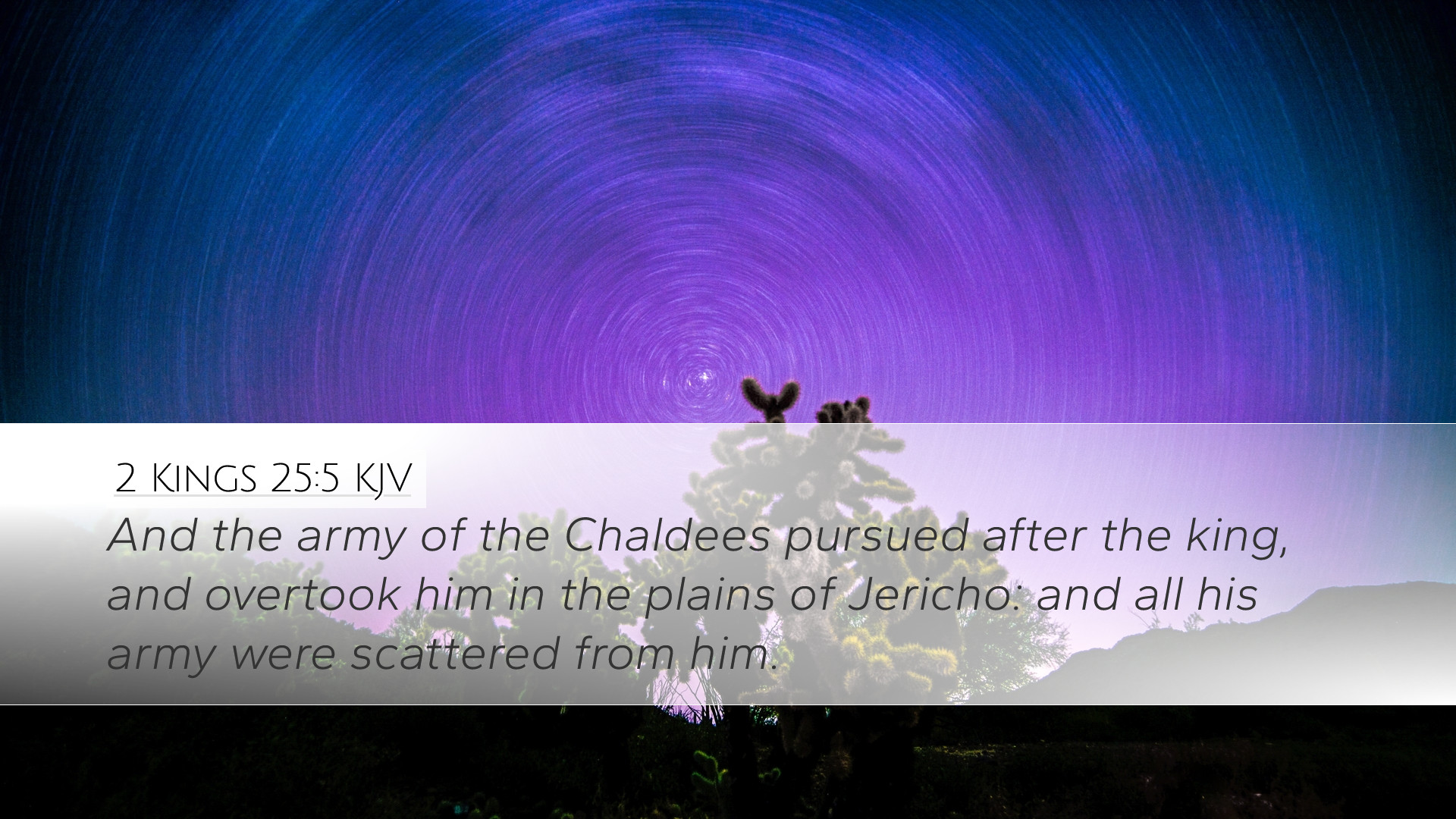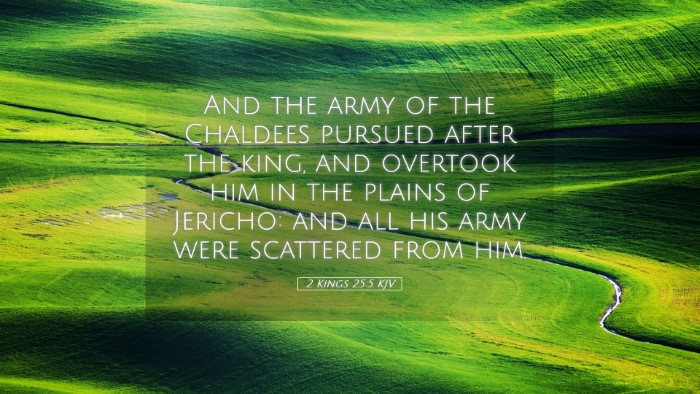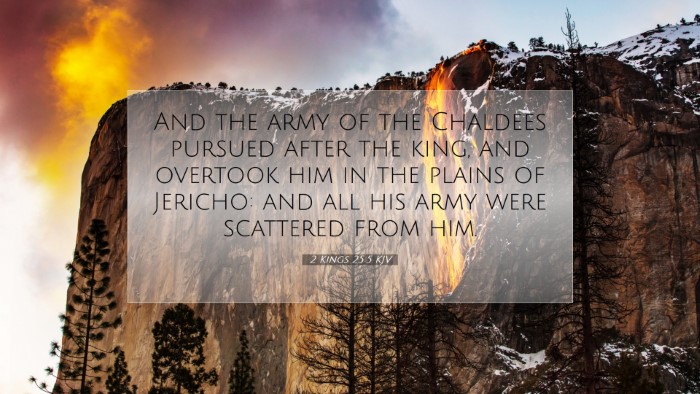Commentary on 2 Kings 25:5
Verse Text: "And the city was broken up, and all the men of war fled by night by the way of the gate between two walls, which is by the king's garden: now the Chaldees were against the city round about: and the king went the way toward the plain."
Introduction
This verse from 2 Kings 25:5 encapsulates the tragic culmination of the siege of Jerusalem by the Babylonians. The narrative presents a vivid image of despair and defeat. In this commentary, we will draw insights from renowned public domain scholars such as Matthew Henry, Albert Barnes, and Adam Clarke, observing how their reflections illuminate the historical, theological, and moral dimensions of this crucial biblical event.
Contextual Background
To appreciate the weight of the verse, it is essential to understand the historical backdrop. The fall of Jerusalem in 586 B.C. marked the end of the Davidic dynasty's rule and a pivotal moment in Israel's history. The Babylonians, under King Nebuchadnezzar, had besieged Jerusalem as a consequence of the nation's persistent idolatry and rebellion against God.
Historical Reflection
Matthew Henry notes that the capture of the city signified not just a military defeat but a spiritual catastrophe for the people of Judah. Jerusalem was not merely a city; it was the religious heart of Israel, the dwelling place of God among His people. The consequences of this fall were profound, with significant theological implications regarding divine justice and judgment.
Exegesis of Key Phrases
"The city was broken up"
Henry emphasizes that the phrase "the city was broken up" paints a picture of total devastation. This was not a mere breach in the wall but a complete dismantling of the city's defenses, symbolizing the fulfillment of prophetic warnings that had long preceded this event.
"All the men of war fled by night"
Albert Barnes provides insight into the desperation of the defenders. The flight of "all the men of war" reveals a lack of faith and courage among the leaders and warriors of Judah. In a time of crisis, rather than standing resolute, they chose to abandon their posts. This act highlights the instilling fear that overtook them and mirrors spiritual lessons regarding facing trials with faith rather than fleeing in fear.
"By the way of the gate between two walls"
Adam Clarke elaborates on the geographical significance of this route. The mention of "the gate between two walls" indicates a strategic escape planned by the king and his men, illustrating not only physical but also spiritual divisions that had developed within the community. This division reflects the nation's broken covenant with God, leading to an internal disunity that mirrored their external defeat.
"The Chaldees were against the city round about"
This phrase corroborates the strategic military prowess of the Chaldeans. Henry comments that the relentless siege by the Chaldeans signifies the inevitable judgment upon Jerusalem due to her sins. The surround by the enemy symbolizes God’s removal of His protective hand over His people, allowing judgment to unfold.
"The king went the way toward the plain"
Barnes interprets the king's decision to flee towards the plain as a sign of absolute desperation. This decision not only signifies a physical escape but seems to indicate a spiritual escape from the consequences of their collective rebellion against God. The flight of King Zedekiah was not only an act of self-preservation; it symbolizes the final rejection of divine authority, as he chose his own way rather than facing the judgment decreed by God through the prophets.
Theological Implications
The downfall of Jerusalem has long been understood as a dire cautionary tale about disobedience and the importance of faithfulness to God. The narrative serves as a sobering reminder of the consequences of forsaking divine guidance:
- Divine Judgment: as articulated by Clarke, the fall of Jerusalem illustrates God's justice in dealing with sin.
- The Necessity of Righteous Leadership: the actions of King Zedekiah reflect the perils of ungodly leadership, highlighting the need for leaders to adhere to God's commands.
- Hope in Despair: Despite the catastrophic events, there remains a theological reassurance that God’s plans for His people, though often clouded by judgment, ultimately lead to restoration.
Lessons for Today
This tragic chapter in Israel's history provides contemporary readers with vital lessons:
- Courage in Crisis: Just as the men of war fled in fear, believers today are often tempted to abandon their faith in difficult times. The call is to remain steadfast.
- Integrity of Leadership: Spiritual leaders must embody integrity and courage, guiding their communities with wisdom and faith in God.
- Faithfulness to God's Word: The narrative warns against neglecting biblical truths and the dangers of collective sin.
Conclusion
2 Kings 25:5 serves as a profound reminder of the fragility of human endeavors when divorced from divine support. Through the commentary of Matthew Henry, Albert Barnes, and Adam Clarke, we glean insights that extend beyond mere history; they challenge us to examine our own lives and the state of our communities in light of divine truth. The destruction of Jerusalem invites reflection upon our covenant with God and provokes a deeper commitment to faithful living, underpinned by the hope of eventual restoration.


